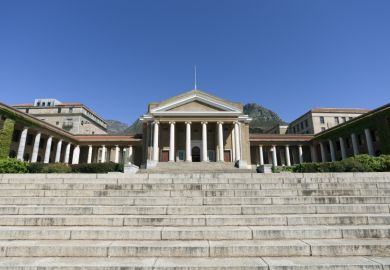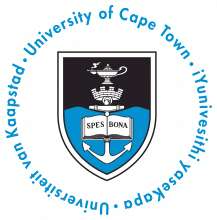After crashing out of the University of Cape Town vice-chancellorship, Mamokgethi Phakeng is locked in a battle to secure her legacy.
Professor Phakeng, an outspoken mathematician who had headed UCT since 2018, is taking early retirement – and a reported pay-off of 12.6 million rand (£569,000) – amid an investigation into the terms of her deputy’s departure and a string of complaints about her conduct. UCT’s council was said to have resolved to suspend Professor Phakeng if she did not agree to go.
The deal brings Professor Phakeng’s tumultuous term at the head of Africa’s highest-ranked university to an abrupt end, with the past few weeks having been no exception. The start of the academic year was delayed by student protests, which took an extraordinary twist when the dean of the law faculty claimed that the executive had known in advance about the demonstrations and “knowingly exposed staff and students to the risk of intimidation, aggression and violence” by failing to share this information.
Jeremy Seekings, director of UCT’s Centre for Social Science Research, said that while Professor Phakeng was highly skilled in “salesmanship and PR”, the past five years “suggest that running a large and complex university is not the best use of her talents”.
“It is hard to see how [Professor Phakeng] could have continued in office when she has clearly lost the confidence of the vast majority of academics, of the governing council, and her colleagues in leadership, who are rumoured to have made it clear that they would all resign if she remained in office for a second term,” Professor Seekings said.
“Over the past few months, she has presided over massive bungling of both salary negotiations and the beginning of the new academic year. Allegations of bullying and other misconduct appear to be unresolved…My sense is that she has lost support even among those students who have supported her hitherto.”
As the rancour at UCT grew, academics had expressed concern about some of Professor Phakeng’s social media postings, including one in which she posed with a rifle over her shoulder.
Amanda Gouws, distinguished professor of political science at Stellenbosch University, said that criticism of Professor Phakeng was “not about wanting to see a black woman fail as many alleged”, but centred on a perception that she “did not take the academic project seriously or the gravitas that comes with the office of the rector”.
“Feminists have fought battles to get more women into management positions at universities, especially black women who are a tiny minority at all South African universities. Professor Phakeng’s behaviour undermines all black women who want to become principals of universities,” Professor Gouws said.
However, speaking to Times Higher Education, Professor Phakeng fought back against allegations that she had lost the support of the campus. She said that four-fifths of the senate voted in favour of her second term last year.
“I have never lost the support of student activists…I am overwhelmed by messages of support,” Professor Phakeng said. “I am getting a lot of staff members – academics and support staff – calling to express how angry they are about how I have been treated.”
The Economic Freedom Fighters, a left-wing political party, claimed that Professor Phakeng had been forced out by “forces within the institution who are anti-transformation” and “fell prey to the historical trope of a black woman being temperamental…simply because she was firm in her style of leadership”.
And Sabelo Hadebe, a senior lecturer in immunology at UCT and secretary general of its Black Academic Caucus, expressed concern that Professor Phakeng had been “forced to take early retirement” by leaks to the media when an independent panel continued to investigate allegations of wrongdoing.
“We as the university community should not allow such an important governance structure to be undermined in such a way just to serve an expedient agenda of purging a black woman from power,” he said.
According to reports, the independent investigation into allegations of poor governance will continue and will consider a previous report by the former university ombudsman, Zetu Makamandela-Mguqulwa, into allegations of bullying made against Professor Phakeng. It is not known when that investigation will conclude.
Register to continue
Why register?
- Registration is free and only takes a moment
- Once registered, you can read 3 articles a month
- Sign up for our newsletter
Subscribe
Or subscribe for unlimited access to:
- Unlimited access to news, views, insights & reviews
- Digital editions
- Digital access to THE’s university and college rankings analysis
Already registered or a current subscriber?









